BOARDWATCH: Board of Education will begin meeting in the community, with November 19 meeting to be held at Westinghouse High School... October 22, 2014 meeting of the Chicago Board of Education continues privatization as usual but makes several surprises public as well
On Wednesday, October 22, 2014, the Chicago Board of Education (BOE) held at its apparently last regular monthly meeting at 125 S. Clark Street, before its move to new headquarters downtown. The Board announced that next month's meeting will be held at George Westinghouse College Prep at 3223 West Franklin Boulevard (near Kedzie) on Wednesday, November 19 at 4:30 p.m. Ample parking should be available in the school's lot. 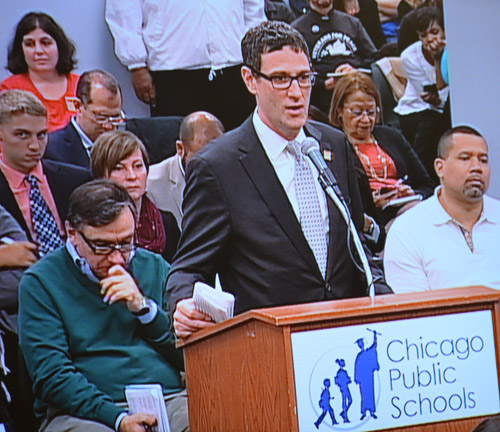 Before outlining three serious problems the Chicago Teachers Union was facing with the Board of Education, CTU Vice President Jesse Sharkey thanked the Board members for their support of Karen Lewis, who is presently dealing with a serious illness. Substance photo by George N. Schmidt.Although parents and community members have requested that BOE meetings be held in the schools instead of downtown, this has not happened in many years. After a policy of alternating meetings between the downtown headquarters and local schools had been ongoing during the last 1990s (following the Board's move from 1819 W. Pershing Road to 125 S. Clark St), the Board stopped meeting in the communities when Arne Duncan became Chief Executive Officer and Michael Scott Board President in 2001. Later in the meeting, an announcement was made that the BOE aims to hold monthly meetings in the schools instead of downtown twice a year, if this works well.
Before outlining three serious problems the Chicago Teachers Union was facing with the Board of Education, CTU Vice President Jesse Sharkey thanked the Board members for their support of Karen Lewis, who is presently dealing with a serious illness. Substance photo by George N. Schmidt.Although parents and community members have requested that BOE meetings be held in the schools instead of downtown, this has not happened in many years. After a policy of alternating meetings between the downtown headquarters and local schools had been ongoing during the last 1990s (following the Board's move from 1819 W. Pershing Road to 125 S. Clark St), the Board stopped meeting in the communities when Arne Duncan became Chief Executive Officer and Michael Scott Board President in 2001. Later in the meeting, an announcement was made that the BOE aims to hold monthly meetings in the schools instead of downtown twice a year, if this works well.
This meeting began at 10:40 a.m. with a welcome from Board President David Vitale. He wished Chicago Teachers Union (CTU) President Karen Lewis a "full and speedy recovery'" and said that, according to interim CTU President Jesse Sharkey, she was as "feisty as ever." He said, "We miss her," "She is the same Karen," and "We appreciate Karen." Chief Education Officer (CEO) Barbara Byrd-Bennett wished Karen Lewis and her husband, John, well and said we "keep them all in prayer."
President Vitale reminded everyone that the sign-up procedure had been changed to what it is now (calling in the week before the meeting) because "people didn't like getting here at early morning hours. People wanted sign-up to be more convenient."
After the Pledge to the Flag, when roll call was taken, all board members were present: Dr. Henry Bienen, Dr. Mahalia Hines, Vice-President Jesse Ruiz, Board President David Vitale, Andrea Zopp, Dr. Carlos Azcoitia, and Deborah Quazzo, Also present were CEO Barbara Byrd-Bennett and Chief Counsel James Bebley.
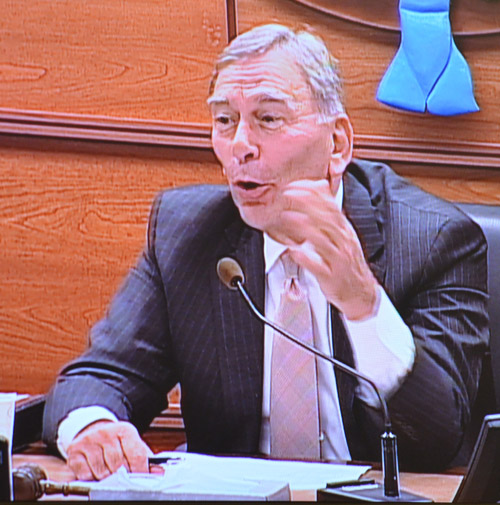 During the presentation from CTU Vice President Jesse Sharkey, Chicago Board of Education President David Vitale was very cordial. Substance photo by George N. Schmidt.The new Honorary Student Board Member, Angel Diaz, a senior from Curie High School, was introduced. Vice-President Ruiz participated in the selection process and said Angel Diaz was pro-active, had observed prior board meetings, and wants to study education law. He has served on CEO Byrd-Bennett's student council and was an Local Student Council (LSC) student representative at Curie High School. He hopes to hold public office some day.
During the presentation from CTU Vice President Jesse Sharkey, Chicago Board of Education President David Vitale was very cordial. Substance photo by George N. Schmidt.The new Honorary Student Board Member, Angel Diaz, a senior from Curie High School, was introduced. Vice-President Ruiz participated in the selection process and said Angel Diaz was pro-active, had observed prior board meetings, and wants to study education law. He has served on CEO Byrd-Bennett's student council and was an Local Student Council (LSC) student representative at Curie High School. He hopes to hold public office some day.
CEO Byrd-Bennett then mentioned the essay topic: How can Latinos be more involved in the betterment of their community? that students were asked to write about during National Hispanic Heritage Month. The winning students were introduced and spoke.
After this, CEO Byrd-Bennett said she was dedicated to Common Core standards and disappointed by the arguments advanced by opponents of Common Core. She expressed concerns about the new Spring assessments, the Partnership for Assessment of Readiness for College and Careers (PARCC). She said she to expand the PARCC pilot by one year. Plans are to give the Northwest Evaluation Association Measures of Progress (NWEA MAP) to all 3-8 students, while the PARCC remained in a preliminary phase. She said too many questions remain about the PARCC.
Dr. Mahalia Hines told her: "You're a rock star." She congratulated CEO Byrd-Bennett and her team for making a decision that is good for parents and teachers.
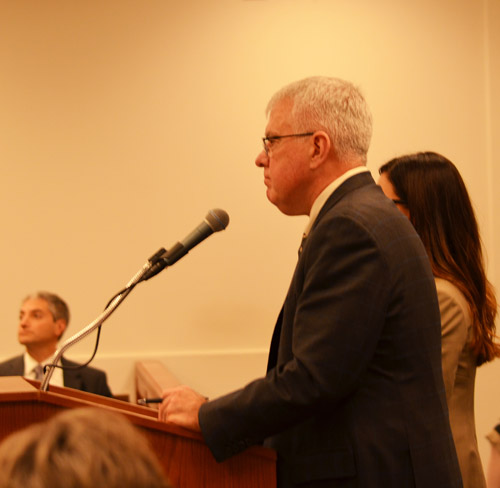 Chief Operating Officer Tom Tyrell explained the "repurposing" work that CPS has been doing since the closing of the unprecedented 50 public schools in 2013. Substance photo by George N. Schmidt.CEO Byrd-Bennett replied that this was CTU President Karen Lewis' concern as well, and that state information was not good. Chief Accountability Officer (CAO) John Barker then mentioned that the PARCC pilot 10% sample is now proposed at randomly-selected schools. CEO Byrd-Bennett told the Board that the NWEA MAP is aligned to the Common Core and will suffice to do the accountability job for the current school year.
Chief Operating Officer Tom Tyrell explained the "repurposing" work that CPS has been doing since the closing of the unprecedented 50 public schools in 2013. Substance photo by George N. Schmidt.CEO Byrd-Bennett replied that this was CTU President Karen Lewis' concern as well, and that state information was not good. Chief Accountability Officer (CAO) John Barker then mentioned that the PARCC pilot 10% sample is now proposed at randomly-selected schools. CEO Byrd-Bennett told the Board that the NWEA MAP is aligned to the Common Core and will suffice to do the accountability job for the current school year.
She then went on to report that the 125 S. Clark Street building will be sold for $28 million to Blue Star Properties and other CPS buildings will be "re-purposed." She said that over a period of time, $70 million will be saved. She turned the podium over to Chief Operating Officer Tom Tyrell, who delivered the repurposing report with the aid of a Power Point. The closed Peabody School is expected to bring in $3.5 million. Tyrell then outlined that there are three categories in the process of re-purposing buildings: immediate reuse, competitive re-deployment, and revitalization. The next schools affected are most likely Peabody, Marconi, Trumbull, Near North, Overton, and Decatur. The state code requires choosing between the top two high bidders.
Next, an announcement was made that the free High School Fair was held on October 4 and 5 at McCormick Place for all schools, not just selective-enrollment schools. Byrd Bennet said that 18,300 students and families attended. Those who made this event successful were thanked.
After this report was concluded, President Vitale announced that office hours are available to meet with Board members by calling 773-553-1600. Everyone was reminded of the location and time of the next meeting at Westinghouse College Prep at 4:30 p.m. on Wednesday, November 19. Those who wish to observe or speak are expected to call the Board beginning at 8 a.m. the Monday before the meeting.
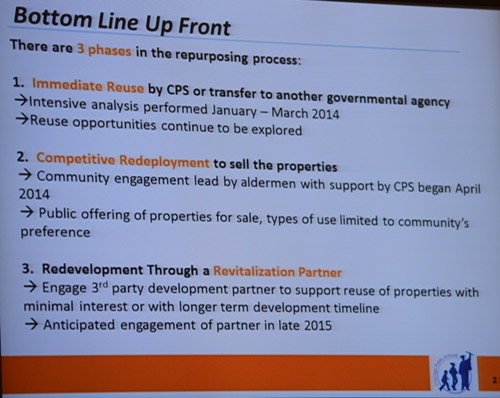 Tyrell's report included a Power Point presentation which was displayed on the overhead screens during the Board meeting but not provided to reporters or members of the public. Above, the second page of the Power Point. Substance photo by George N. Schmidt.Public participation then began at 11:14 a.m. with interim CTU President Jesse Sharkey, who thanked the Board for the best wishes extended to Karen Lewis and said that we will continue to respect her wishes to keep her health status out of the public eye. He then went on to talk about three issues: 1) the CTU/CPS contract expires at the end of the 2015 school year when the CTU will address broader conditions and creative ways to support financing at schools, 2) revenue which includes the banks' windfall, toxic swaps, social impact bonds, and 3) teacher evaluation scores from last year that have not yet been released.
Tyrell's report included a Power Point presentation which was displayed on the overhead screens during the Board meeting but not provided to reporters or members of the public. Above, the second page of the Power Point. Substance photo by George N. Schmidt.Public participation then began at 11:14 a.m. with interim CTU President Jesse Sharkey, who thanked the Board for the best wishes extended to Karen Lewis and said that we will continue to respect her wishes to keep her health status out of the public eye. He then went on to talk about three issues: 1) the CTU/CPS contract expires at the end of the 2015 school year when the CTU will address broader conditions and creative ways to support financing at schools, 2) revenue which includes the banks' windfall, toxic swaps, social impact bonds, and 3) teacher evaluation scores from last year that have not yet been released.
Sharkey thanked the Board for moving the next Board meeting offsite and extending the pilot period for PARCC. Chief Accountability Officer John Barker took the podium at Byrd Bennett's request and explained that the teacher evaluations will emerge soon. Interim CTU President Sharkey then said that the teachers were being evaluated for this year without knowing their evaluations from last year.
Lara Pruitt, of Lane Tech High School, was next to speak. She is a parent and former CPS teacher. She said that the PARCC cannot be used to assess growth and that the test is a science experiment. She added that students should be paid for their time in taking the test. She also said that all students would lose instructional time by taking the test. She remarked that the PARCC is not even used for college admissions and that the American College Testing (ACT) assessment is scheduled during the same time period. She asked, "What the value of lost college admissions?"
Then, Rachel Lessem, a parent and LSC member at Pritzker Elementary School and member of Raise Your Hand, said she wanted a waiver to suspend the PARCC and said that it should never be a high-stakes test. Instead of the ten hours needed on the PARCC, children should have time to learn. She added that the PARCC is not needed for Common Core. She concluded by saying, "We are setting children up to fail a test that has no validity."
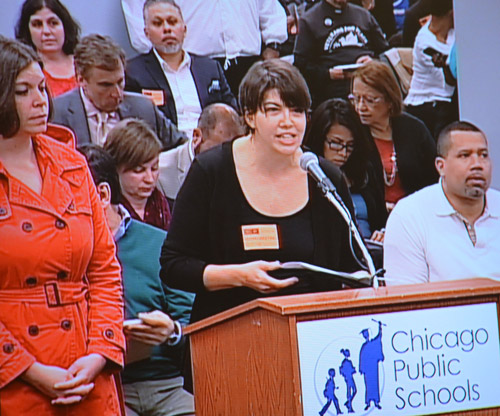 After thanking the Board for reducing the PARCC testing for this school year, Cassie Creswell of More Than A Score noted that the enormous cost of the testing programs was a major problem. Substance photo by George N. Schmidt.Cassie Creswell, of More Than a Score, thanked the Board for the response to the petition "Park the PARCC." She said that $40 million would be spent on the PARCC, it was poorly designed, and it disrupts instructional time. She added that the Pearson Company has a history of incompetence.
After thanking the Board for reducing the PARCC testing for this school year, Cassie Creswell of More Than A Score noted that the enormous cost of the testing programs was a major problem. Substance photo by George N. Schmidt.Cassie Creswell, of More Than a Score, thanked the Board for the response to the petition "Park the PARCC." She said that $40 million would be spent on the PARCC, it was poorly designed, and it disrupts instructional time. She added that the Pearson Company has a history of incompetence.
Claire Wapole, of Raise Your Hand, said she took a sample PARCC test meant for third graders. She said she was university-educated and she was frustrated by the test. She remarked that the children would feel stupid and won't be able to get the answers right. She added that the PARCC is painfully confusing, poorly written, and students will guess.
The monthly lineup of people praising charter schools was next. Veronica Bedoya, parent of a child at Speer Academy, said she applied to all high schools and ended up choosing a Noble Campus school. Andrew Dayghrity, has a child at Chicago International Charter Schools (CICS) Ralph Ellison School, and is pleased at the progress of his child. He thanked the Board. Shalah Brown, also a parent of three children at CICS Ralph Ellison School, said that she, too, was pleased with her children's progress. She thanked the Board for their support and the wonderful learning environment.
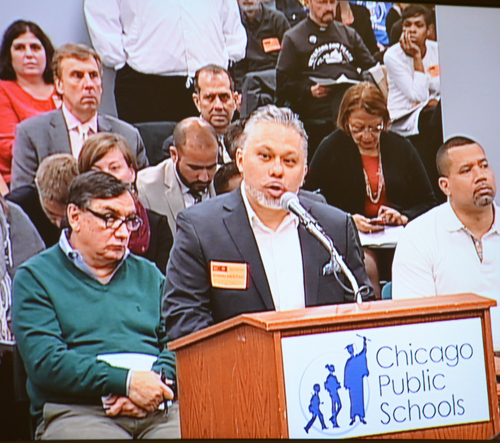 Hancock High School teacher Ray Salazar told the Board the hearings on the transformation of Hancock into a magnet college prep school held on October 21 were an insult. He also said that the Hancock building was not adequate for the job, and that the "Southwest Side" should have a new building for its college prep magnet high school, rather than the old Hancock building. Substance photo by George N. Schmidt.Ray Salazar, a teacher at Hancock High School and writer of the "White Rhino" blog, said the Hancock High will now be a selective enrollment (SE) High School. He remarked that the October 21 hearing on the conversion of Hancock was an insult and that the present Southwest side building housing Hancock was unacceptable and an inadequate structure.
Hancock High School teacher Ray Salazar told the Board the hearings on the transformation of Hancock into a magnet college prep school held on October 21 were an insult. He also said that the Hancock building was not adequate for the job, and that the "Southwest Side" should have a new building for its college prep magnet high school, rather than the old Hancock building. Substance photo by George N. Schmidt.Ray Salazar, a teacher at Hancock High School and writer of the "White Rhino" blog, said the Hancock High will now be a selective enrollment (SE) High School. He remarked that the October 21 hearing on the conversion of Hancock was an insult and that the present Southwest side building housing Hancock was unacceptable and an inadequate structure.
Jeanette Taylor, of Mollison Elementary said that she wanted the wrong done to Mollison students to be undone. She said that the Board continues to dis-invest in Mollison. She said that the students receive free lunch and yet free lunch forms were not required to be filled out. She asked for a grace period to turn in the lunch forms and that the Pre-K be moved up the street so two kindergartens can be kept in the school.
Cathy Burke, also of Mollison, said that the children eat in the gym, the school needs support, $147 thousand had been lost, the Board sabotages the school, and that the children did terribly on test scores. She asked, "How will this be addressed?" She was directed to a staff member.
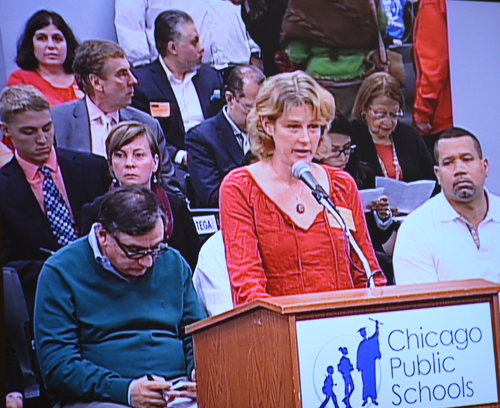 Kerry Murphy told the Board that the overcrowding at Dever Elementary School on Chicago's Northwest Side was so severe that the local PTA had to hold its recent meeting on the school's front steps. CPS officials, who had ignored the school's plea a month earlier, did not explain how they would provide for the PTA to meet in December, January and February, although some critics believe that Chief Administrative Officer Tim Cawley is planning to privatize the shelters for such school, hiring tent companies for the cold weather meetings. Substance photo by George N. Schmidt.Kerry Murphy spoke of the overcrowding at Dever Elementary School. She said a dance class was held in the all-purpose room at the same time as lunch was served with only a divider between the two areas. She said it was very noisy. Because of where the children play ball, balls go into the street constantly, and the Parent Teachers Association (PTA) meeting was held outside on the front steps of the school.
Kerry Murphy told the Board that the overcrowding at Dever Elementary School on Chicago's Northwest Side was so severe that the local PTA had to hold its recent meeting on the school's front steps. CPS officials, who had ignored the school's plea a month earlier, did not explain how they would provide for the PTA to meet in December, January and February, although some critics believe that Chief Administrative Officer Tim Cawley is planning to privatize the shelters for such school, hiring tent companies for the cold weather meetings. Substance photo by George N. Schmidt.Kerry Murphy spoke of the overcrowding at Dever Elementary School. She said a dance class was held in the all-purpose room at the same time as lunch was served with only a divider between the two areas. She said it was very noisy. Because of where the children play ball, balls go into the street constantly, and the Parent Teachers Association (PTA) meeting was held outside on the front steps of the school.
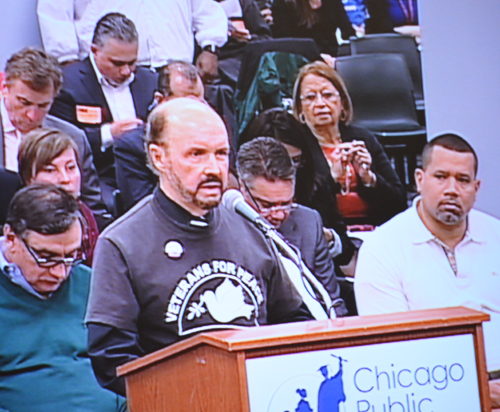 Veterans for Peace leader Arnold Stieber, a Vietnam vet, continued his organization's persistent critique of the militarization of Chicago's public schools. In his remarks, Stieber noted that the military "solution" to problems has always and will always be to use violence, and that is what is being taught to children in Chicago's military schools, despite claims from some individuals (and CPS officials), including some erstwhile "progressives," that the militarization of CPS schools (and the expansion of ROTC programs) is really providing children with a safe disciplined environment in which to learn. Substance photo by George N. Schmidt.Arnold Stieber of Veterans for Peace, introduces himself as "a grandfather and Army vet from the Viet Nam war." He repeated his regular remarks to the Board of Education that the military teaches violence as the way to solve problems, as part of his organization's critique of the CPS policies expanding "military academies" and JROTC programs. Stieber said that conflict resolution "by violence and following orders" -- the military way -- is also taught in schools and programs where the military is predominant. He reminded everyone to check out futureswithoutviolence.org and quoted Dr. Martin Luther King, Jr's famous 1968 speech in opposition to the Vietnam War that "the greatest purveyor of violence is my government."
Veterans for Peace leader Arnold Stieber, a Vietnam vet, continued his organization's persistent critique of the militarization of Chicago's public schools. In his remarks, Stieber noted that the military "solution" to problems has always and will always be to use violence, and that is what is being taught to children in Chicago's military schools, despite claims from some individuals (and CPS officials), including some erstwhile "progressives," that the militarization of CPS schools (and the expansion of ROTC programs) is really providing children with a safe disciplined environment in which to learn. Substance photo by George N. Schmidt.Arnold Stieber of Veterans for Peace, introduces himself as "a grandfather and Army vet from the Viet Nam war." He repeated his regular remarks to the Board of Education that the military teaches violence as the way to solve problems, as part of his organization's critique of the CPS policies expanding "military academies" and JROTC programs. Stieber said that conflict resolution "by violence and following orders" -- the military way -- is also taught in schools and programs where the military is predominant. He reminded everyone to check out futureswithoutviolence.org and quoted Dr. Martin Luther King, Jr's famous 1968 speech in opposition to the Vietnam War that "the greatest purveyor of violence is my government."
EvAngel YHWHnewBN, lately of the "Global Committee Commemorating King Days," began with her claim that children should not be called "kids." She told everyone that " you know the drill, Kick the K word." She said a child has two legs and we should call them boys and girls, not a slang word like "kid". She added that proper grammar should be used in schools. Then she spoke of placing a red, black, and green wreath on December 18, 2015, in honor of the signing of the 13th Amendment. She also wants the Bible used as a textbook in Chicago's schools. She said the President swears on a Bible and that the Bible is also used in a court of law.
George Blakemore continued his speeches against "illegal immigrants." "Illegal immigrants,", he says regularly, are taking jobs from Black people. He said that some people at CPS are not going by what he calls "the rule of law." He said that "illegal immigrant children" use the resources of the school system, while Black children's schools are closed. When asked to "please conclude," before his two minutes were up, he said, "You should have a clock." He said, "The Board's clock ticks one way when you want to hear what is being said and ticks another way when you don't want to hear."
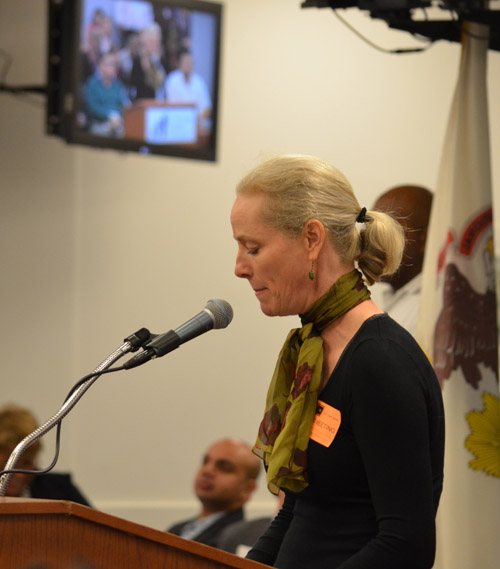 Michelle Villegas continued her campaign to get the Board to stop building the unnecessary extra building at Lincoln Elementary School in the wealthy Lincoln Park community on Chicago's North Side. Substance photo by Nate Goldbaum.Michelle Villegas, of Equity in Education Chicago, said that in the Lincoln Park area, there are 2,500 excess seats, that CEO Byrd-Bennett was confirming moving boundaries and sharing of schools. She added that the Illinois Appellate Court said that schools must abide by zoning laws. She spoke of the gleaming annex on the North side in Lincoln Elementary School and the shameful waste of taxpayer funds that was happening because CPS was building an unnecessary building for Lincoln Elementary while across the city schools in poorer communities were being told there was no money for facilities help.
Michelle Villegas continued her campaign to get the Board to stop building the unnecessary extra building at Lincoln Elementary School in the wealthy Lincoln Park community on Chicago's North Side. Substance photo by Nate Goldbaum.Michelle Villegas, of Equity in Education Chicago, said that in the Lincoln Park area, there are 2,500 excess seats, that CEO Byrd-Bennett was confirming moving boundaries and sharing of schools. She added that the Illinois Appellate Court said that schools must abide by zoning laws. She spoke of the gleaming annex on the North side in Lincoln Elementary School and the shameful waste of taxpayer funds that was happening because CPS was building an unnecessary building for Lincoln Elementary while across the city schools in poorer communities were being told there was no money for facilities help.
Katrina Karkazis Lionikis, of Lincoln Elementary, said that the school's playground was gone due to overcrowding and a secret deal that was hatched. She added that a committee should have been allowed a voice in the process.
Maira Fernandez, also of Lincoln Elementary, a former CPS student, CPS teacher, and a parent of CPS students, said "The loss of our playground without community consent or opportunity of involvement is against a basic American privilege." She added that the children want their playground and other avenues should be considered.
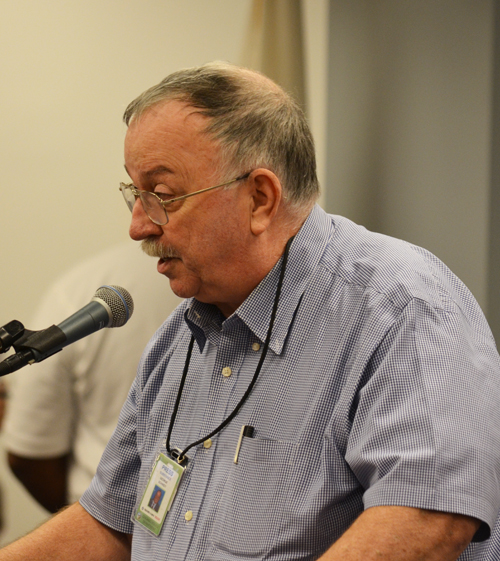 Substance editor George Schmidt demanded to know why the Board was not arbitrating on the swaps, and was interrupted by security while he was speaking back and forth on the issue with Board Vice President Jesse Ruiz, who claimed that CPS had investigated the issue and decided that nothing was wrong with what had been done ten years earlier. Substance photo by Nate Goldbaum.George Schmidt, Substance Editor and CPS parent, said he was usually angry at the Board because of forty years of hypocrisy, the time since Substance began covering the Board. But he offered one cheer for the decision of the Board to restrict the PARCC tests this year. Then he spoke of "CPS finances and frauds, failures and finaglings" in relation to the "Swaps" on interest rates that were costing the Board millions of dollars each year. He noted that in 2004, interest rate swaps were first utilized, even though the Board required only fixed rate borrowing until it changed its policy in 2008. Schmidt noted that with the new opportunity to go to arbitration on the swaps, CPS had the opportunity to recoup millions of dollars.
Substance editor George Schmidt demanded to know why the Board was not arbitrating on the swaps, and was interrupted by security while he was speaking back and forth on the issue with Board Vice President Jesse Ruiz, who claimed that CPS had investigated the issue and decided that nothing was wrong with what had been done ten years earlier. Substance photo by Nate Goldbaum.George Schmidt, Substance Editor and CPS parent, said he was usually angry at the Board because of forty years of hypocrisy, the time since Substance began covering the Board. But he offered one cheer for the decision of the Board to restrict the PARCC tests this year. Then he spoke of "CPS finances and frauds, failures and finaglings" in relation to the "Swaps" on interest rates that were costing the Board millions of dollars each year. He noted that in 2004, interest rate swaps were first utilized, even though the Board required only fixed rate borrowing until it changed its policy in 2008. Schmidt noted that with the new opportunity to go to arbitration on the swaps, CPS had the opportunity to recoup millions of dollars.
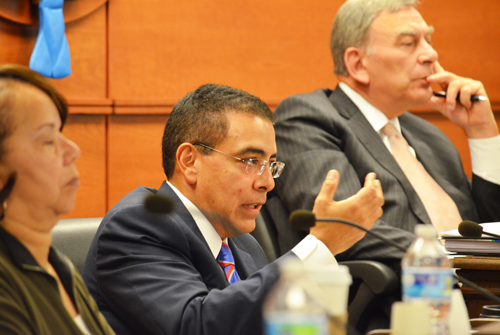 While Mahalia Hines (left) shut her eyes as George Schmidt addressed the issue of the swaps, Board Vice President Jesse Ruiz, a millionaire lawyer, claimed that there was nothing to arbitrate because the Board had checked out what had happened ten years ago, when Arne Duncan did the swap deals, and discovered that nothing illegal had been done. Substance photo by Nate Goldbaum. He said that the swaps from ten years ago were entered into without the downside being exposed. Board Vice President Jesse Ruiz said that there was no basis for going to arbitration. Later, Board members claimed that the history of the swaps was available to the public, which is not true, according to Schmidt.
While Mahalia Hines (left) shut her eyes as George Schmidt addressed the issue of the swaps, Board Vice President Jesse Ruiz, a millionaire lawyer, claimed that there was nothing to arbitrate because the Board had checked out what had happened ten years ago, when Arne Duncan did the swap deals, and discovered that nothing illegal had been done. Substance photo by Nate Goldbaum. He said that the swaps from ten years ago were entered into without the downside being exposed. Board Vice President Jesse Ruiz said that there was no basis for going to arbitration. Later, Board members claimed that the history of the swaps was available to the public, which is not true, according to Schmidt.
Two speakers from the Multilingual Parent Council were next. Maricela Salazar-Villareal, of Equity in Education Chicago, in translated Spanish, spoke about the activities of the organization. Raul Rodriguez, of Chicago Multilingual Parent Council Executive Board, also spoke of the activities of this organization. He welcomed the Board to attend their meetings.
Gerald Schultz, of "Level One" (not on probation) Dore Elementary just west of Midway Airport, spoke of overcrowding at the school, with an average of 35 children in classes. He said that there is no library and that they are short 100 computers or more. He handed out a brochure and asked the Board to help with the overcrowding. He was told that someone from the Board will go to the school.
Dasia Skinner, of the Chicago Coalition for the Homeless, talked of students being in temporary living situations. She added that homeless students are put at risk of being denied support and asked the Board to include homeless people in the development of its policy on the education of homeless people.
She was followed by people who described their experiences trying to get an education while being homeless in Chicago.
Marilyn Escoe, also of the Chicago Coalition for the Homeless, talked about her experience with homelessness as a single parent who was also taking care of her own parent. She said that it needs to be spelled out what parents and schools can expect.
Sam Jones said he was homeless and lived in abandoned buildings and shared clothes with his brother. Because of this, he said that he is an expert on homelessness. He said that the homeless policy needs to keep up with current law and details of the policy are needed in a document and not just on the website.
Taishi Neuman said she has experienced homelessness, had multiple sclerosis and was unemployed. She had to choose between a coat or boots for her child and chose the coat, which left her child to wear gym shoes instead of boots in the winter. She said that the policies of Students in Temporary Living Situations (STLS) were vague and not detailed enough. She added that there should be an official policy for information that is not just on the website.
Former Congressman Ralph Miller, of Grais & Ellsworth, LLC, told the Board that he came to this meeting "to offer an expert legal opinion about potential legal claims arising from the district's interest rate swap deals." He went into detail about how arbitrations across the country have recouped millions of dollars for governmental agencies who were not informed of the risk of the variable rate "swaps." The Board dispatched a recent executive (who hadn't been with CPS when Arne Duncan did the swaps ten years ago) to assure him that the Board had done everything it could to investigate the situation -- but that CPS was not going to request the arbitrations.
Maria Silva, of Farragut High School and an LSC member for 12 years, said our students are suffering. She referenced No Child Left Behind (NCLB) and "Equal opportunity of education for all students including special ed students and community concerns with the principal and her leadership in our community."
Melisa Romero, also of Farragut High School, said she was in contact with CPS' Chief Officer of Networks, Denise Little, and CEO Byrd-Bennett. She said that students had been mistreated, harassed, hit by staff, and stayed in suspension for two months. She said that enrollment had dropped from 2500 before to 950 now. She added that the school is International Baccalaureate (IB) compatible but had not made progress. She also said that the school is weak and Ms. Hammacher needs to be removed. She was referred to staff and CEO Byrd-Bennett said she had met with the principal and would get back to Ms. Romero.
Martha Valdez, of Curie High School and a community member, spoke of a hazardous condition where the firewall has come down and the 3000 students must now use one corridor on the first floor. She also addressed a sanitation issue.
Breana Southern, a parent and an LSC member at Beethoven Elementary School (with 400 students), said that the principal has no goals or plans for improvement in place. She said there are no books (although the principal said that Math and Reading books were ordered in September), the main office is locked during the day, copies cannot be made, SPED students are missing the lessons being given, and anyone who wants to meet with the principal must wait long times to meet with her. She added that the principal was still there after receiving a low evaluation last year.
Last to speak was Lawrence Ligas, a parent, of Ogden School. He said he wants to meet with CEO Byrd-Bennett about bullying at Ogden School. He said that his son was traumatized for a year and called "a gay boy." He said that his son is not gay, that staff ignored complaints, and that the staff needs training. He said that he is looking forward to meeting with CEO Byrd-Bennett soon.
At the conclusion of public participation, President Vitale asked for comments and questions.
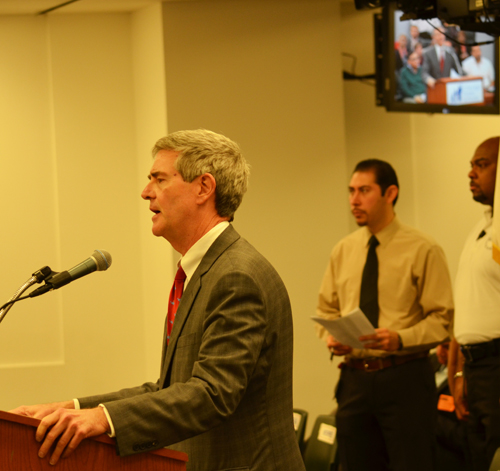 Former Congressman Brad Miller tried to get the members of the Board of Education to see the importance of applying to arbitrate the "toxic swaps" that had been entered into by former CEO Arne Duncan and former Mayor Richard M. Daley ten years ago, but the Board members treated the retired Congressman to an onslaught of doubletalk, including false claims that the Board has investigated the entire history of the swaps and that there was nothing withheld at the time Duncan illegally ordered them. In 2004, when many of the current swaps were entered into, the Chicago Board of Education's policy on borrowing required fixed rate borrowings -- in other words, the swaps were illegal. It was not until 2008 that CPS changed its borrowing policy to make variable rate bonds legal -- four years after the swaps had been entered into by the man who since 2009 has been the U.S. Secretary of Education. Substance photo by George N. Schmidt.Dr. Bienen said that the Board needs a document which gives accounting of bonds and swaps over the last decade. Vitale replied by repeating his false claim that everything is "public." "Definitely," Vitale said. "It is public information and most is already in the public domain." He added that a lot of analysis has been done, although he didn't say how the public might find it.
Former Congressman Brad Miller tried to get the members of the Board of Education to see the importance of applying to arbitrate the "toxic swaps" that had been entered into by former CEO Arne Duncan and former Mayor Richard M. Daley ten years ago, but the Board members treated the retired Congressman to an onslaught of doubletalk, including false claims that the Board has investigated the entire history of the swaps and that there was nothing withheld at the time Duncan illegally ordered them. In 2004, when many of the current swaps were entered into, the Chicago Board of Education's policy on borrowing required fixed rate borrowings -- in other words, the swaps were illegal. It was not until 2008 that CPS changed its borrowing policy to make variable rate bonds legal -- four years after the swaps had been entered into by the man who since 2009 has been the U.S. Secretary of Education. Substance photo by George N. Schmidt.Dr. Bienen said that the Board needs a document which gives accounting of bonds and swaps over the last decade. Vitale replied by repeating his false claim that everything is "public." "Definitely," Vitale said. "It is public information and most is already in the public domain." He added that a lot of analysis has been done, although he didn't say how the public might find it.
Responding to the concerns raised by Jesse Sharkey about the teacher evaluations, Andrea Zopp said that not knowing the evaluations from last year was "unconscionable" and "we need to fix it." She also referred to the remarks about the Hancock building being a terrible building while the North side was getting nice building and asked for verification. Tim Cawley, CPS' "Chief Administration Officer," took the podium to discuss the question about the Hancock building. Cawley replied that it was a nice old building that was obtained from the Chicago Archdiocese and not a brand new building. Nobody on the Board asked why Cawley, rather than someone form CPS Facilities or the COO, was speaking about the building. President Vitale said it was a perfectly acceptable building and could be refreshed.
Vice-President Ruiz mentioned priorities with additional funds and that Brooks, Lindblom, and Payton have more labs, technology and resources than the typical high school.
Andrea Zopp then said she felt there were a significant number of factual inaccuracies regarding Mollison. She said she will revisit the school and feels that the principal is outstanding.
Dr. Bienen mentioned overcrowding of a significant number of schools. He said that he feels that nothing is more important than dealing with overcrowding, that it is the number one priority. Deborah Quazzo spoke of social impact bonds, an item on the agenda for the re-development of the Child Parent Centers. It was mentioned that these are not exactly bonds and the Board believes in this. By investing in children early, we will need less SPED supports later, and more Pre-K will reduce expenses for CPS in the future.
Dr. Bienen said that he was very uneasy with this and while we don't question the good motives of those putting up the money, he will have a very hard time supporting this.
Mahalia Hines seems to believe that whatever funds are not coming from the CPS budget can be raised at the local school level if principals are trained to go for grants. Dr. Hines asked if CPS has plans for workshops for principals on "outside partnerships." She said CPS can train chiefs and principals to pick up some of the deficits by doing fundraising. She added that a homelessness policy was needed, probably on both sides.
CEO Byrd-Bennett said that some principals are very good at getting outside support.
Vice-President Ruiz asked for more information about the bullying at Ogden. CEO Byrd-Bennett said that there is "high gear training" around the issue of bullying and effective techniques that should be used. Ruiz said that the term "hate crime" is a legal term and should not necessarily be used for school bullying.
Dr. Azcoitia said that CPS should fund the exact number of students that have been approved in charter schools.
Once again, Vitale referred to information presented during public participation that was not correct again today. Previously, he has been using the phrase "true facts" to indicate the information the Board members know to be true, as opposed to the information presented by members of the public, which he generally denigrates as false facts.
Joining Vitale, Andrea Zopp said that comments about Lincoln Elementary School were not "factually correct" and that we need to understand what's going on at Orozco, Dever, and Beethoven. CEO Byrd-Bennett said we will update this and that some information was not accurate.
President Vitale said that the Board is subject to state and national regulations and that is the law. He said that there were other venues for the public to express themselves.
The meeting ended with something the adult Board members might not have been expecting. Honorary Student Board Member Angel Diaz was asked to explain the hazardous and sanitation issues spoken about during public participant earlier, and at pervious Board meetings. As readers know, there had been several exposes of the failures of the Aramark contract to provide custodial services to the schools.
Diaz explained he said that when you go into a bathroom, every bathroom should have soap, indicating that this isn't true for all washrooms at his school.
Regarding custodians, he said that in his four years, the school was "much better" in his freshman and sophomore years [before Aramark] than it is now.
Vice-President Ruiz replied to this.
At 1:08 p.m., Dr. Hines read the statement calling for a closed session and the Board recessed into closed session.


By: Kerry Murphy
Dever Elementary
Apparently BBB doubts the overcrowding issues at Dever Elementary. If she would like to see a photo of the PTA meeting we held on the front steps it is right here on the PTA facebook page. https://www.facebook.com/DeverElementary/photos/pb.209992582389161.-2207520000.1414348001./717057761682638/?type=3&theater